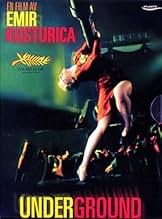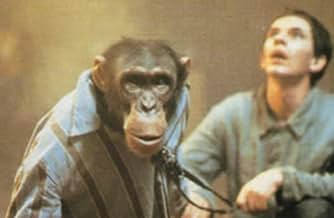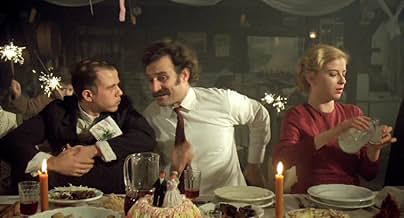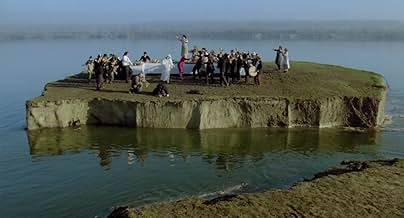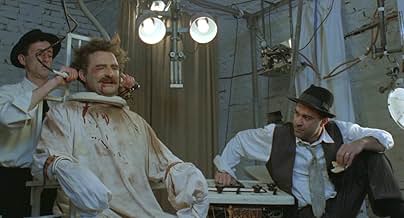NOTE IMDb
8,0/10
63 k
MA NOTE
Un groupe de socialistes serbes se prépare à la guerre dans une cave surréaliste qui allient fêtes, tragédies, amour et haine.Un groupe de socialistes serbes se prépare à la guerre dans une cave surréaliste qui allient fêtes, tragédies, amour et haine.Un groupe de socialistes serbes se prépare à la guerre dans une cave surréaliste qui allient fêtes, tragédies, amour et haine.
- Réalisation
- Scénario
- Casting principal
- Récompenses
- 8 victoires et 11 nominations au total
Predrag 'Miki' Manojlovic
- Marko
- (as Miki Manojlovic)
- …
Srdjan 'Zika' Todorovic
- Jovan
- (as Srdjan Todorovic)
Danilo 'Bata' Stojkovic
- Deda
- (as Bata Stojkovic)
Nele Karajlic
- Falling Gypsy
- (as Dr. Nele Karajlic)
Avis à la une
Kusturica believes (and so do I) that countries don't fall apart but are actively ripped apart. So if you want to see a short summary of Yugoslav history 1941-92 and an artist's view of why it fell apart, this movie will tell you more about it than many political books or articles. Almost everybody is portrayed with varying degrees of guilt: the communists for lying to the people, Germany for bombing Belgrade in 1941, Germany again for supplying the weapons in 1991, all nationalists... Please do not be surprised if you read negative reviews for Kusturica has stepped on many folks' feet. Invest some time, it's one of the best films in the past 15-20 years. BTW: The soundtrack is excellent, go listen.
Comical, chaotic, patriotic, satirical, philosophical, questioning, critical, ironic and many other things, throughout the plot we perceive the different layers of the plot, which in turn, requires a certain abstraction from those who watch, because in general, the characters and lived situations are just abstractions or representations.
Divided into three acts, it tells the story from the beginning to the end of Yugoslavia, through WWII, the Cold War and the dissolution of the country. We have four characters, and here, I'm going to talk a little bit about what each one represents, according to what I understand.
Crni: The Partizans, who truly love the country, fight and die for it.
Natalija: Yugoslavia itself, which at a certain moment is with Germany represented by the Official, at a certain moment with the Rebels, and a good part with the Politicians.
Marko: The corrupt, politicians, generals who, in order to stay in power, commit the greatest atrocities and betray the trust of even their brothers, friends and family.
Ivan: The Yugoslav people, who, don't understand what's happening when the war starts, much less when the war ends and Yugoslavia ends. Perhaps symbolized as on crutches, due to the country's institutional fragility.
In the first act, we have the second world war, where Natalija has love for the first three characters (Crni and German Officer, Marko), representing, the passage of domination throughout history, Crni at one point tries to date Natalija, but who does date her? Is the officer, and after the war with the Allied victory ends up staying with Marko. Also, we have a memorable scene of Ivan hitting the officer and saying, "You think you're going to have her, you filthy pig."
In the second act, we have the cold war and also the longest act of the film, I believe due to the long 40 years of the period. Right now we have The characters trapped living in a basement forced to build weapons, living under sub-human conditions, which to me means, the curtain of communism in relation to capitalism. The guns, it represents, perhaps the arms race. Marko, the politician/general who profits and lives very well from this arms trade (portrayed in Lord of War) while leaving the people living in fear of enemy domination, closed to the world that exists beyond the basement.
In the last act, we have Ivan, totally weakened from having lived through so many wars, who discovers he is being deceived all the time about the basement and the lies told as a form of control, coming across the capitalist world for the first time, having a shock to discover that your country no longer exists. In fact, the doctor who talks to him, perhaps represents NATO.
The most interesting thing for me is that the film does not seek to point out right and wrong, villains and heroes, only to portray the facts in a raw and comic way.
Anyway, I hope that my interpretation of what this film tries to tell will help other cinephiles. I'm Brazilian so I may have misunderstood the film if that's the case forgive me, I did a quick read about Yugoslav history to write this review.
Divided into three acts, it tells the story from the beginning to the end of Yugoslavia, through WWII, the Cold War and the dissolution of the country. We have four characters, and here, I'm going to talk a little bit about what each one represents, according to what I understand.
Crni: The Partizans, who truly love the country, fight and die for it.
Natalija: Yugoslavia itself, which at a certain moment is with Germany represented by the Official, at a certain moment with the Rebels, and a good part with the Politicians.
Marko: The corrupt, politicians, generals who, in order to stay in power, commit the greatest atrocities and betray the trust of even their brothers, friends and family.
Ivan: The Yugoslav people, who, don't understand what's happening when the war starts, much less when the war ends and Yugoslavia ends. Perhaps symbolized as on crutches, due to the country's institutional fragility.
In the first act, we have the second world war, where Natalija has love for the first three characters (Crni and German Officer, Marko), representing, the passage of domination throughout history, Crni at one point tries to date Natalija, but who does date her? Is the officer, and after the war with the Allied victory ends up staying with Marko. Also, we have a memorable scene of Ivan hitting the officer and saying, "You think you're going to have her, you filthy pig."
In the second act, we have the cold war and also the longest act of the film, I believe due to the long 40 years of the period. Right now we have The characters trapped living in a basement forced to build weapons, living under sub-human conditions, which to me means, the curtain of communism in relation to capitalism. The guns, it represents, perhaps the arms race. Marko, the politician/general who profits and lives very well from this arms trade (portrayed in Lord of War) while leaving the people living in fear of enemy domination, closed to the world that exists beyond the basement.
In the last act, we have Ivan, totally weakened from having lived through so many wars, who discovers he is being deceived all the time about the basement and the lies told as a form of control, coming across the capitalist world for the first time, having a shock to discover that your country no longer exists. In fact, the doctor who talks to him, perhaps represents NATO.
The most interesting thing for me is that the film does not seek to point out right and wrong, villains and heroes, only to portray the facts in a raw and comic way.
Anyway, I hope that my interpretation of what this film tries to tell will help other cinephiles. I'm Brazilian so I may have misunderstood the film if that's the case forgive me, I did a quick read about Yugoslav history to write this review.
10ycornu-1
Underground is The Film, my favorite... And nobody hasn't written any greeting comments in 2005. So, I'm happy to be the first and I wish the best year 2005 to all the Underground's fans. If you never had this chance to see the long version (5 hours) of the film, give your priority, this year, to watch it. After this, the Palme d'Or version will feel you so short!!! If you live in Paris, I can help you to discover the complete Chef d'Oeuvre.
Therefore, I understand that the film could be criticized on the political depths. But it is so easy to make movies without any involvement. Kusturica worked for 3 years on the film and involved himself on the content. But the film treatment is not only about Balkans war, but mainly about human ferocity and betrayment. Speaking Cinema, there is no film controlling so well aestheticism, scenario, actors, music and creativity. Emir did it and I am sorry that some arrogant journalists killed the film, getting it off the Cinema theaters without the popular success that Underground deserved.
Therefore, I understand that the film could be criticized on the political depths. But it is so easy to make movies without any involvement. Kusturica worked for 3 years on the film and involved himself on the content. But the film treatment is not only about Balkans war, but mainly about human ferocity and betrayment. Speaking Cinema, there is no film controlling so well aestheticism, scenario, actors, music and creativity. Emir did it and I am sorry that some arrogant journalists killed the film, getting it off the Cinema theaters without the popular success that Underground deserved.
Underground is without a doubt, one of the very finest movies to emerge from Europe. After seeing Underground, one realizes that one has just witnessed cinema at one of it's highest levels. This movie is what "The Tin Drum" was supposed to be, and so much more. Absolutely Brilliant on all levels.
While attending college in Boston a Croatian friend of mine told me about this movie. I rented it a few days later, and let me say this is one of the greatest foreign films I have seen. While the historical and political substance of the film is largely missed by me, the story is strong enough that I connected emotionally with it. The humor of the film is very refreshing, being used to war films that are too heavy or dull to make me laugh. I recommend this film to anyone who appreciates a well told story. You will be rewarded with a beautiful picture.
Le saviez-vous
- AnecdotesThe director's cut ran for over 320 minutes.
- Versions alternativesThere is a 300 minutes version of this film produced for television.
- ConnexionsFeatured in Cannes... les 400 coups (1997)
Meilleurs choix
Connectez-vous pour évaluer et suivre la liste de favoris afin de recevoir des recommandations personnalisées
- How long is Underground?Alimenté par Alexa
Détails
- Date de sortie
- Pays d’origine
- Langues
- Aussi connu sous le nom de
- Once Upon a Time There Was a Country
- Lieux de tournage
- Plovdiv, Bulgarie(Tunels)
- Sociétés de production
- Voir plus de crédits d'entreprise sur IMDbPro
Box-office
- Budget
- 14 000 000 $US (estimé)
- Montant brut aux États-Unis et au Canada
- 171 082 $US
- Montant brut mondial
- 182 134 $US
- Durée2 heures 50 minutes
- Couleur
- Mixage
- Rapport de forme
- 1.85 : 1
Contribuer à cette page
Suggérer une modification ou ajouter du contenu manquant



